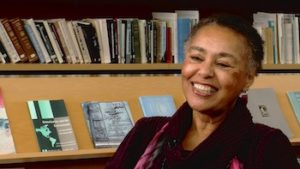
Dr. Judy Richardson
*Judy Richardson was born on this date in 1944. She is a Black Film producer, author, educator, and activist.
Born in Tarrytown, New York, her father was autoworker William King Richardson, and her mother stated office worker Mae Louise Tucker Richardson. Richardson grew up in the "under the hill" section of Tarrytown. The town was in the legendary "Sleepy Hollow country" made famous by author Washington Irving. Her father helped organize the United Auto Workers (UAW) local at the Chevrolet plant in Tarrytown and died "on the line" when she was seven years old. Richardson graduated from Sleepy Hollow High School in 1962 and was accepted to Swarthmore College on a full, four-year scholarship. She also attended Columbia University, Howard University, and Antioch College.
During her freshman year at Swarthmore, Richardson joined the Swarthmore Political Action Committee (SPAC), an SDS affiliate. During that time, Richardson traveled with other SPAC volunteers to assist the Cambridge, Maryland, communities in desegregating public accommodations. She was allowed to join the SNCC staff and left college to work first in SNCC's national office in Atlanta, where she worked closely with James Forman, Ruby Doris Smith-Robinson, Julian Bond, and others.
When the national office moved to Mississippi during the 1964 Mississippi Freedom Summer, she moved, too. She also worked on SNCC's projects in Lowndes County, Alabama, and Southwest Georgia. In 1965, she became office manager for Julian Bond's successful first campaign for the Georgia House of Representatives. She also organized a northern "Freedom School" to unite young activists from SNCC's Southern projects and Northern support offices.
In 1968, Richardson and other former SNCC staffers founded Drum and Spear Bookstore in Washington, D.C. It became the largest Black bookstore in the country. She was also the Children's Editor of Drum & Spear Press. In 1970, she wrote an essay on racism in Black children's books, published by Howard University's Journal of Negro Education. In 1979, Richardson began working with Henry Hampton/Blackside Productions on an early version of what became the Eyes On The Prize series.
Major production for that Academy Award-nominated, six-hour PBS series began in 1986, and she became a researcher and content advisor. She was Series Associate Producer for Eyes On The Prize II, the subsequent eight-hour series. Beginning in 1982, she was director of information for the United Church of Christ Commission for Racial Justice, participating in its protests against police brutality in New York City and its bus caravans to the Alabama Black Belt to counter the Reagan Administration's intimidation of elderly Black voters.
Richardson later co-produced Blackside's 1994 Emmy and Peabody Award-winning documentary, Malcolm X: Make It Plain (for PBS' The American Experience). As a senior producer for Northern Light Productions in Boston, Richardson produces historical documentaries for broadcast and museums, with a focus on African American historical events, including a one-hour documentary on the 1968 Orangeburg Massacre (South Carolina) for PBS; two History Channel documentaries on slavery and slave resistance; and installations for, among others, the National Park Service's Little Rock Nine Visitor's Center, the National Underground Railroad Freedom Center (Cincinnati), the New York State Historical Society's "Slavery in New York" exhibit, and the Paul Laurence Dunbar House (Dayton).
Dr. Richardson has also edited, with five other SNCC women, Hands on the Freedom Plow: The Personal Testimonies of Women in SNCC. The work includes the stories of over fifty SNCC women. Richardson receives an Image Award for Vision and Excellence from Women in Film and Video. She lectures writes, and conducts professional development workshops for teachers about the history and values of the American Civil Rights Movement and their relevance to issues we face today.